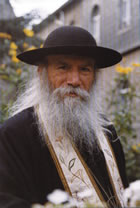Cool Dude
With guys like Michael Burghardt in Iraq the scumbag Islamofascists will be overcome. This guy has what it takes in spades.

Earlier on this day he had signed up for another three months of duty, then went about his business in the wild Tammim neighborhood in a western corner of Ramadi, a Sunni Triangle city of 400,000 west of Fallujah on the main road to
Burghardt regarded Ramadi as “the scariest place on Earth.”
Four American soldiers had just been ambushed and killed there, and Sergeant Burghardt, part of the Explosive Ordnance Disposal (EOD) Team supporting the 2nd Brigade 28th Infantry Division (Pennsylvania Army National Guard), was ordered to help sweep the area for the kind of secondary explosives the Islamist terrorists often planted to kill soldiers reacting to a first bomb or ambush.
Along the area’s evacuation route, Burghardt noticed an odd piece of shrapnel in an eight-foot wide crater five feet deep. He jumped into the hole wearing only a flak jacket and helmet, not the bulky protective suit designed for those in bomb disposal. “You can’t react to any sniper fire” in that suit, he told a reporter, “and you get tunnel vision.”
The terrorist bombs, he knew, had been getting bigger. In 2005 one destroyed a 25-ton amphibious assault vehicle, killing 14 of his fellow Marines. IEDs in his time in
“Pink mist” is how Burghardt and his fellow bomb defusers describe what they turn into if they make a mistake. Five EOD team members Burghardt worked with had been blown to bits by such bombs, one of them only three weeks earlier. “It’s a vague science,” he later said of bomb disposal. “Some art, some guesswork and some luck. Explosives do weird things. Sometimes they kill you. Sometimes they just blow you out of a hole. But we’re beating the insurgents. We’re getting to them so much that they’re targeting us. I take that as a compliment.”
Inside the crater Burghardt pulled out the trusty Shrade 7 inch knife that he had carried since 1994 and began probing the ground. Suddenly he saw a glint of telltale orange plastic covering a Senao base station. He quickly cut the wire leading from it, his hand following it to uncover two buried 122 millimeter cannon shells that had been rigged to explode.
Burghardt patted his head, a signal to nearby soldiers that he had found a bomb. A captain grabbed press photographer Jeff Bundy of the Omaha World-Herald and pushed him down out of harm’s way.
What Burghardt saw too late was another wire leading between his legs to a third such cannon shell. A distant terrorist, probably watching through binoculars, triggered it by remote control. The explosion hurled Sargeant Burghardt’s body 10 feet into the air. His limp frame came smashing down, face first, on the roadway.
As fellow soldiers rushed toward the limp body of Sargeant Burghardt, whom they knew as “Iron Mike,” he was awake. While still in the air, he had thought “I don’t believe they got me” and was already feeling “ticked off they were able to do it.”
After hitting the ground, Burghardt was unable to feel anything from the waist down. “I was lying there thinking I didn’t want to be in a wheelchair next to my dad,” Burghardt remembered, “and for him to see me like that.”
Around his body, his fellow soldiers looked down at his shredded uniform. After the gigantic explosion, they were amazed he still had legs and was clearly alive. They quickly began cutting off what remained of his pants.
“I felt a real sharp pain and blood trickling down,” the Sargeant remembered. “Then I wiggled my toes and I thought, ‘Good, I’m in business.”
Medics arrived with a stretcher, but Burghardt had other ideas.
“I decided to walk to the helicopter,” he said. “I wasn’t going to let my team-mates see me being carried away on a stretcher.”
And he wanted to send a message to the cowardly terrorist still probably watching from afar. He stood, then raised a one-fingered salute of defiance toward this bomb and all insurgents.
The press photographer Bundy snapped a picture of Burghardt’s bold gesture, and his image would soon speed around the world via patriotic web sites and be posted on thousands of American walls, bulletin boards and refrigerators.
But back in
Sergeant Michael Burghardt suffered injuries in this bomb blast, mostly from scrapnel in his legs and posterior. He described the three weeks it took him to recover and return to duty as among the longest of his life. “I don’t want a ticket out,” he said when told that his wounds might send him home. “I want to stay here so we can take as many people home as possible. I’ll do 30 years, as long as I’m having fun. Unless I die.”
 The Bush Doctrine, based on a recognition of the dangers posed by non-democratic regimes and on committing the United States to support the advance of democracy, offers hope to many dissident voices struggling to bring democracy to their own countries. The democratic earthquake it has helped unleash, even with all the dangers its tremors entail, offers the promise of a more peaceful world.
The Bush Doctrine, based on a recognition of the dangers posed by non-democratic regimes and on committing the United States to support the advance of democracy, offers hope to many dissident voices struggling to bring democracy to their own countries. The democratic earthquake it has helped unleash, even with all the dangers its tremors entail, offers the promise of a more peaceful world. Not a wimpy looking guy!
Not a wimpy looking guy!
